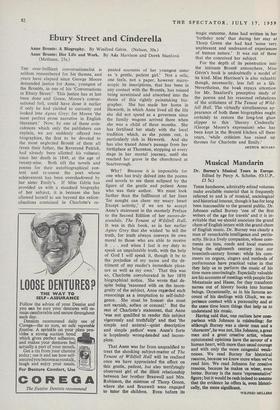Musical Mandarin
THESE handsome, admirably edited volumes make available material that is frequently referred to and is of musical, sociological and historical interest, though it has for long been inaccessible to the general public. Dr. Johnson called Burney 'one of the first writers of the age for travels' and it is in- evitable that we should associate the grand cham of English letters with the grand cham of English music. Dr. Burney was clearly a man of remarkable intelligence and pertin- acity. He is a lively companion, whose com- ments on inns, roads and local customs bring the eighteenth century into our twentieth-century homes: while his com- ments on organs, singers and methods of performance have practical value in that they help us to perform the music of his time more convincingly. Especially valuable are his accounts of meetings with people like Metastasio and Hasse, for they transform names out of history books into human beings. Occasionally, as in his famous ac- count of his dealings with Gluck, we ex- perience contact with a personality and at the same time learn things that help us to understand his music.
Having said that, one realises how com- parison with Johnson is misleading: for although Burney was a clever man and a 'character', he was not, like Johnson, a great man and a great creative artist, whose opinionated opinions have the savour of a human heart, with more than usual courage and with only the more congenial weak- nesses. We read Burney for historical reasons, because we know more when we've read him. We read Johnson for creative reasons, because he makes us wiser, even better. Burney is the more 'representative' figure; but it would be rash indeed to assume that the evidence he offers is, even histori- cally, the more significant.
W!LFRID MELLERS






































 Previous page
Previous page